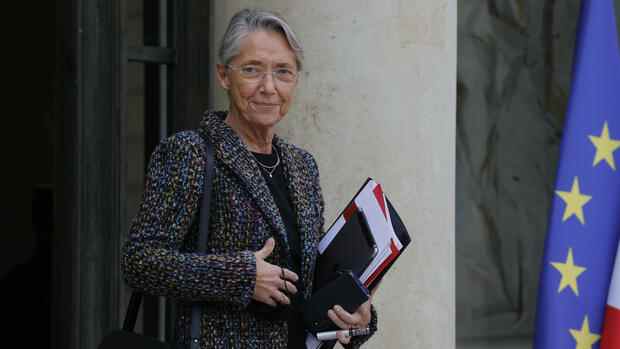The new French prime minister is politically left of center.
(Photo: Polaris/laif)
Paris The headline on Emmanuel Macron’s government reshuffle read: The French President has appointed a female Prime Minister. Élisabeth Borne is only the second woman in the history of France to head the government – after Édith Cresson, who only held office for 11 months three decades ago.
Borne’s choice is a strategic move ahead of June’s general election: the outgoing labor minister used to be close to the Socialists and could win back center-left voters disappointed by Macron’s center-aligned alliance. She also credibly represents ecological issues such as climate protection.
With the choice of women, the President is also trying to counter criticism that his closest circle of power consists of a clique of men. Borne particularly emphasized this aspect after her appointment on Monday evening: She dedicates her new position to “all young girls” to whom she wants to say: “Go to the end of your dreams.”
As Prime Minister, the 61-year-old will primarily be in charge of day-to-day government. Head of state Macron, who was re-elected for a second term at the end of April, sets the major political lines. Forming a government after the presidential elections is common in France – also to gain new impetus for the subsequent elections to the National Assembly.
Top jobs of the day
Find the best jobs now and
be notified by email.
Borne succeeds Jean Castex, who has been prime minister since summer 2020. She is considered a technocrat and has never held an elected office. She is now running for Macron’s Liberal Party in June and has a good chance of gaining a seat in parliament in her home town of Calvados in north-western Normandy.
Advisor to Lionel Jospin
Borne is the daughter of a pharmacist, her father died when she was eleven years old. She graduated from the Paris École Polytechnique, the elite forge for engineers in France. She was an advisor to the socialist Prime Minister Lionel Jospin in the late 1990s and also worked for the socialist environment minister Ségolène Royal as head of cabinet.
She later headed the public transport company in Paris – and then joined Macron’s newly founded party “La République en Marche” (“The République in Motion”). Under the President, she was initially responsible for the transport department in 2017, then served as environment minister and finally as transport minister. In her functions, she was responsible for prominent projects in Macron’s first term, such as reforms of the state railway SNCF and unemployment insurance.
The first thing Borne has to do as prime minister is fulfill the president’s promise to address French concerns about a loss of purchasing power after his re-election. She doesn’t have much time: the first round of the parliamentary elections will take place on June 12, followed a week later by the crucial second round. Macron’s fiercest competition is the new electoral alliance, to which left-wing populists, Greens and Socialists have joined forces.
If the president fails to secure a majority in the National Assembly, Borne’s time as prime minister could quickly come to an end. In this case, Macron may be forced to reshuffle the government again, taking political opponents into account.
More: Alliance with EU critic Mélenchon – SPD and Greens have a problem with their sister parties
